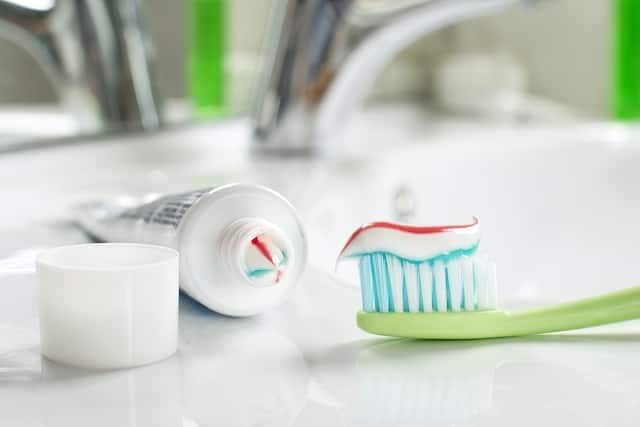What is the Mineralisation of Teeth?
Before discussing methods for remineralising teeth, it’s essential to understand the naturally occurring tooth remineralisation process and demineralisation. According to the Indian Dental Association, every day, minerals are added to and lost from a tooth’s enamel layer thanks to plaque bacteria and sugars in the mouth (demineralisation). When a person eats sugar and other refined carbohydrates, these bacteria produce acid that removes minerals from the surface of the tooth. Minerals such as fluoride, calcium and phosphate are redeposited (remineralisation) to the enamel from the foods and waters consumed. That means that when there is an imbalance between these two processes—say, when there is too much demineralisation and not enough mineralisation, tooth decay can occur.
Remember, this is a natural process that happens to everyone; according to a study in the National Institute of Health, teeth are naturally at risk of demineralisation simply due to their location and exposure. Luckily though, they’ve developed a resistance to localised demineralisation that’s stronger than bone because of this exposure.
Your mouth is one big ecosystem; it’s just a matter of making sure everything is in balance. And one of the most critical factors in that balance—and thus remineralisation—is your saliva.
Why Saliva is So Important
Saliva is one of the mouth’s natural defences against this process as it repairs the tooth enamel following exposure to acids. Saliva promotes remineralisation, i.e. it is capable of depositing minerals in porous areas where demineralisation of enamel or dentine has occurred. Saliva is super-saturated with calcium and phosphate at pH 7; this favours the deposition of calcium. According to the Indian Dental Association, fluoride found in a person's saliva will absorb onto the surface of a tooth where demineralisation (tooth decay formation) has occurred. The presence of this fluoride in saliva in turn actually attracts other minerals (such as calcium), thus helping to speed up the rate or degree to which remineralisation (reformation of tooth mineral) will occur. Bet you never thought you’d be so thankful for saliva!
But the presence or amount of saliva in your mouth isn’t the only important part of remineralisation—the proper acid/alkaline balance in your saliva (also known as pH level) is also a critical player in this process. According to an article published in Loma Linda University Health, the ideal pH in your mouth should be 5.6 or above. However, this level decreases when you eat or drink foods and beverages other than water, causing minerals to leave the teeth and leave them at risk of tooth decay. But when your saliva pH returns to its neutral state, it promotes tooth remineralisation.
It’s important to note that some autoimmune diseases, salivary conditions, and medications can affect your salivary flow or cause dry mouth, so it is essential to discuss your medical history when visiting your dentist.
While this all might sound a bit scientific and complicated, it’s all-natural. And as mentioned above, your teeth are continually going through these processes, so you want to focus on creating an environment where minerals stay in your teeth. And it’s pretty easy!
Prevention
At this point, you may be wondering: how do I maintain my saliva’s pH balance so my teeth can remineralise? How can I prevent demineralisation? Your levels of saliva, diet, and oral hygiene habits all play a vital role in the remineralisation of your teeth. Here are some specific ways to maintain a well-balanced mouth that’s ready for mineralization.
- Maintain a proper saliva pH: Because saliva plays such a vital role in maintaining your mouth’s pH, it’s important to make sure you’re producing saliva. One common technique is to swish water in your mouth after eating and drinking. According to the Indian Dental Association, chewing helps cure bad breath. Whether you choose sugarless gum, fennel seeds or fresh parsley, the action of chewing produces saliva and provides a pleasant odour that helps to cover bad smells.
- Use fluoride toothpaste: Fluoride is one of the most common and effective methods in preventing demineralisation and can be found in most pharmacies.
- Floss daily: Flossing helps eliminate hard-to-reach food in your mouth, which can be a cause of bacteria that weakens your enamel.
- Add probiotics to your diet: Probiotics, or “good bacteria” like Lactobacillus and Bifidobacterium, are typically found in dairy products like yogurt and can also be taken as supplements. A research study published in the Journal of Education and Ethics in Dentistry suggests that probiotics play a beneficial role in preventing common oral health problems such as dental caries, periodontal disease, fungal infections (candida) and halitosis.
- Avoid foods high in sugar, carbohydrates, and acidic foods: The National Health Portal of India notes that the development of caries requires sugars and bacteria to be present. When we eat or drink foods containing sugars, the bacteria in plaque produce acid that attacks the tooth enamel. Sticky foods such as toffees, chocolates, ice cream, honey, sugar, soda, dried fruit, cake, cookies, hard candy and mints, dry cereal, and chips increase chances of tooth decay.
- Talk to your dentist: Your dentist or dental hygienist will be able to identify cavities or spots in your mouth that lack enamel strength, and if caught early, they may recommend or prescribe an effective fluoride treatment.
Products That Remineralise Teeth
Suppose you want to add a remineralisation product to your oral habits. In that case, there are plenty of OTC (over-the-counter) products that are proven to help replenish minerals. The best place to start? A fluoride toothpaste, which can be found at most drug stores and pharmacies. Fluoride is a crucial ingredient in remineralisation because, once fluoride is in your enamel, it combines with calcium and phosphate to create a defence system that prevents cavities.
A research study published in the Journal of Conservative Dentistry notes that the new phosphopeptide isolated from the milk protein casein, combined with calcium phosphate (CPP-ACP nanocomplexes), has recently been shown to be efficacious in both the prevention and reversal of enamel subsurface lesions in caries, and result shows that therefore ACP-CPP can also aid in remineralisation.
A research study published in the Journal of Pharmaceutical Sciences and Research notes that Xylitol, a polysugar, obtained from birch tree has been shown to reduce dental caries when mixed with food, chewing gums and milk. Reduction in caries rate are greater, when xylitol is used as the sugar substitutes, its effects enhance remineralisation and helps arrest dentinal caries.
Finally, if you have concerns about remineralisation, talk to your dentist or dental hygienist about the best plan, whether that’s using a particular toothpaste, adjusting your diet, or looking into medications. But above all, remineralisation is a natural process that can be managed best by you. Your health, diet, and lifestyle all contribute to the state of your enamel, and with the right preventative care, you can continuously remineralise it before it goes away.
This article is intended to promote understanding of and knowledge about general oral health topics. It is not intended to be a substitute for professional advice, diagnosis or treatment. Always seek the advice of your dentist or other qualified healthcare provider with any questions you may have regarding a medical condition or treatment.
ORAL HEALTH QUIZ
What's behind your smile?
Take our Oral Health assessment to get the most from your oral care routine
ORAL HEALTH QUIZ
What's behind your smile?
Take our Oral Health assessment to get the most from your oral care routine









